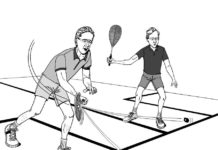By Kevin Klipstein
Of the several dozen pieces I’ve written for this space, one that seems to have struck a chord was the recent “Preserving the Essence of Squash.” In it I concluded that “perfect behavior on court is not the goal, and it never will be. Rather, it is our goal to encourage everyone in the game to be courteous, respectful and responsible for his or her own behavior. This, I believe, is critical to preserving the essence of the game.”
One interesting observation is the number of parents of junior players who thanked me for writing it. In an age of, let’s call it overly “enmeshed” parenting, it seems that many parents are looking for help in setting the guard rails for appropriate behavior for their children on and off the court. In fact, any effort we make to highlight the importance of sportsmanship appears to be welcomed and appreciated by parents and coaches alike.
So you may be able to imagine my reaction last week when I came across the following exchange in Dan Patrick’s Sports Illustrated piece, “The Interview,” with Danica Patrick, a 27-year-old Indy Racing League driver:
Dan: If you could take a performance-enhancing drug and not get caught, would you do it if it allowed you to win Indy?
Danica: Well, then it’s not cheating, is it? If nobody finds out?
Dan: So you would do it?
Danica: Yeah, it would be like finding a gray area. In motorsports we work in the gray areas a lot. You’re trying to find where the holes are in the rule book.
I had to re-read that exchange a few times to make sure I was reading it correctly. Was Danica Patrick really saying that she did not believe it would be cheating if she didn’t get caught?
Several things troubled me about this possibility. Ms. Patrick is considered a role model for girls around the world, a young woman who has achieved success in an archetypical male sport. Motorsports is renowned for drivers and their teams looking for an advantage, or as Ms. Patrick put it, “holes in the rule book.” However, there are rules and breaking them is cheating, whether you get caught or not. The idea that a paid professional in any sport may not understand this fundamental concept disturbed me.
More disturbing, though, was the realization of just how accepted this belief is in sports these days. In pro cycling it’s so accepted that the athletes themselves truly do not think they are cheating since everyone is doing it. Baseball’s use of performance enhancing drugs was tolerated, not only among the players, but also by the sport’s governing body itself.
So do kids really have a chance to develop a sense for true sportsmanship when some of sports’ biggest figures flout the rules or make their own? While it may be more of a struggle than in past generations, due to our culture’s habit to worship sports celebrities and their ubiquity in the media, practice makes perfect, which is why squash offers some of the best training in sportsmanship.
With so many opportunities to create “gray areas” while playing squash, from subtly causing interference while clearing, to calling questionable lets, under the best of circumstances officiating squash is a challenge. This means that fair play is really within the control of each player on every point. Play enough squash, with parents and coaches sending and reinforcing consistent messages about sportsmanship, and there may be reason to hope we will nurture a generation as critical of Danica Patrick’s nonchalant treatment of the rules as I appear to be.





